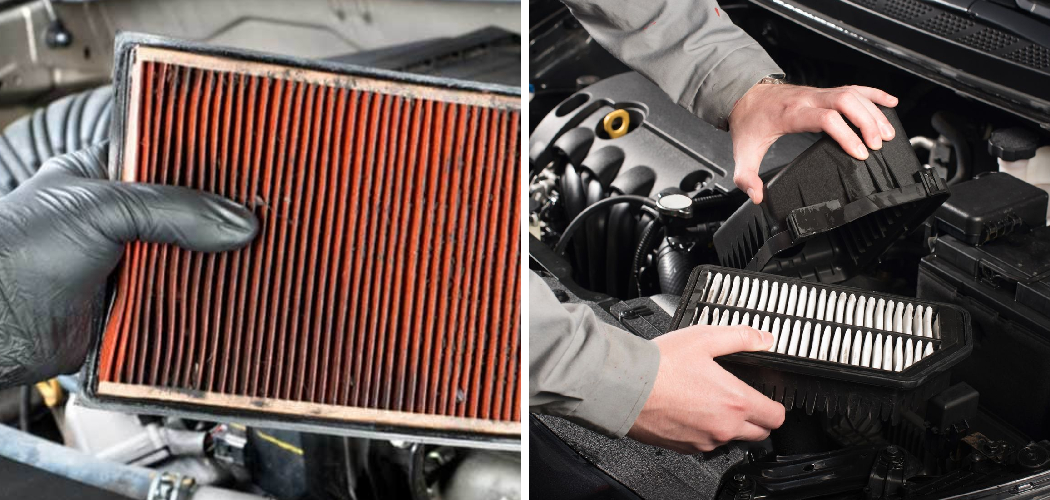An effective air filter is crucial for keeping your Jeep’s performance at its peak. Understanding how to extend the life of your Jeep’s air filter enhances engine efficiency and fuel economy and contributes to the longevity of your beloved ride.
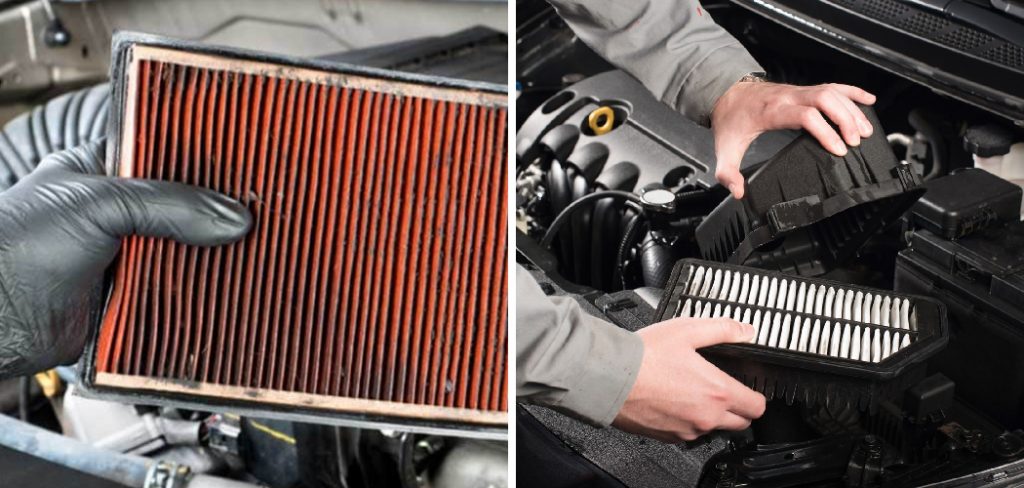
This comprehensive guide will provide you with essential tips and strategies on how to extend the life of jeep air filter, ensuring your vehicle continues to conquer trails with untamed power and reliability. Let’s explore the best practices to maintain this vital engine component.
Understanding the Jeep Air Filter System
Nestled within your Jeep, the air filter protects against contaminants residing in the air intake system and protects your engine from harmful debris. It sits snugly near the top of the engine compartment for most models, a strategic position that maximizes its efficacy.
Jeep owners can choose from various air filter types according to their needs: the standard paper filters, which excel in cost and convenience; the high-performance synthetic filters that promise improved airflow and engine response; or the environmentally friendly washable filters that can be reused after cleaning, offering a longer service life.
Additionally, some Jeeps come equipped with a cabin air filter, a separate entity that purifies the air within the vehicle’s interior, ensuring a cleaner and healthier environment for passengers.
How to Extend the Life of Jeep Air Filter: A Beginner’s Guide
1. Factors Affecting Air Filter Life
Many factors determine the life expectancy of your Jeep’s air filter, chief among them being the driving conditions to which your vehicle is regularly subjected. A jaunt through the serene city streets vastly differs from the rough and tumble demands of off-road excursions.
Dust-laden trails and dirt-clogged paths strain your air filter, causing it to succumb to clogs and wear much faster than typical urban driving would dictate.
Adhering to a meticulous maintenance schedule is instrumental in prolonging the lifespan of your air filter. Regular oil changes contribute to overall engine cleanliness, indirectly affecting air filter conditions by minimizing the potential for oil-soaked debris and contaminants.
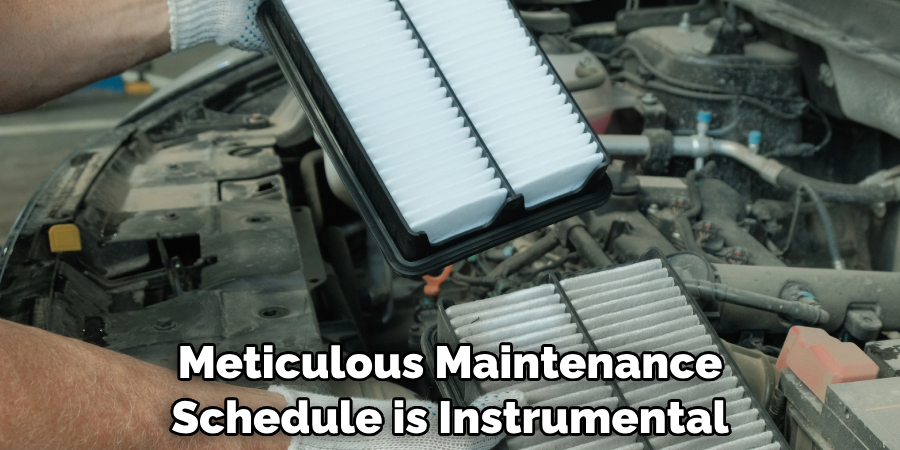
Conversely, neglect in this area can lead to a build-up of particles that are not only an impediment to performance but also a harbinger of premature air filter demise.
Despite your best efforts, unforeseen foes such as rodents can wreak havoc; a mouse nesting in an air intake is more common than one might think. Further, loose debris can be sucked into the air intake, causing damage or blocking airflow entirely. Consequently, regular inspections are not merely recommended; they’re an integral part of savvy vehicle upkeep, ensuring that the path your engine breathes through remains clear and unobstructed.
2. Recognizing Signs of a Clogged Air Filter
Detecting a clogged air filter in your Jeep might be more subtle than expected. Gradual loss of engine power, a noticeable dip in fuel economy, or the engine rough idling – especially at stop lights or during start-up – are telltale signs that your air filter may be hampered by dirt and debris. In more advanced stages, a clogged filter may trigger your check engine light or other intake system-related warning indicators on the dashboard, signaling that it’s high time for inspection.
Proactively acknowledging these symptoms and regular maintenance checks can thwart the negative impacts on your Jeep’s performance and efficiency. Regular inspections not only catch clogs before they compromise your engine but also reinforce the role of preventative maintenance in prolonging your vehicle’s health and vitality.
3. Recommended Practices for Long Filter Life
To bolster your air filter’s longevity and your engine’s health, adhere to the insights presented in Understanding the Jeep Air Filter System. Regularly opt for the appropriate filter type, assess your Jeep’s exposure to contaminants, and engage in preventative maintenance practices tailored to your driving habits.
4. Regular Inspections and Cleaning
Your Jeep’s air filter is healthy and depends on the environment it battles. In the relentless embrace of dusty back roads and dirt tracks, the scrutiny of your filter must be as frequent as once a month to prevent excessive accumulation of abrasive particles. Conversely, for the urban warrior, a quarterly inspection—every three months—ensures breathing ease for your engine.
Visually assessing your air filter requires diligence and an eye for detail. Lift the hood and locate the air filter housing near the top of your engine compartment. Release the clasps or screws securing the casing, and gently lift the cover. With the filter in full view, inspect for a telltale coat of dust or grime, often more pronounced around the pleats. Look for signs of damage: tears, dampness, or oil saturation may indicate the need for immediate replacement.
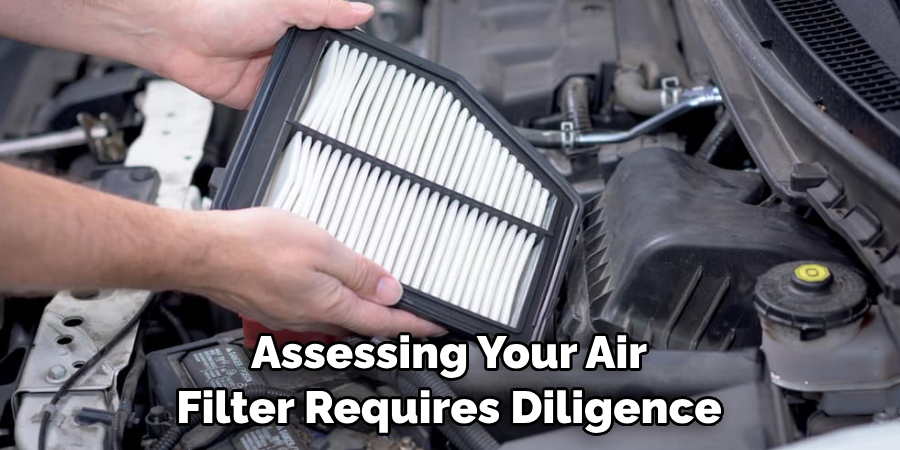
Should your filter be of the reusable variety, a thorough cleaning will restore its health. Gently remove the filter, being cautious not to dislodge debris into the air intake. Wielded with precision, a burst of compressed air can expel stubborn dust clingers from the fibers, though directing the airflow from the clean side to avoid deeper contamination.
For a deeper clean, lightly tap the filter to dislodge larger particles, and if necessary, employ a manufacturer-approved cleaning solution. Apply the solution gently, wash, and make certain the filter is completely dry before reinstalling it to avert mold growth or airflow obstruction.
In the face of a heavily soiled or damaged filter, replacement is not merely a suggestion—it’s a necessity. Proactive maintenance, including timely filter replacement, may seem like an upfront cost but pays dividends in preventing escalated engine damage and preserving fuel efficiency, which far outweighs the modest investment in a new air filter.
5. Choosing the Right Replacement Filter
Selecting the correct replacement air filter for your Jeep calls for deliberation and an understanding of the various options available. Manufacturer-recommended air filters are designed specifically for your vehicle, ensuring an ideal fit and optimized performance, thereby typically recommended for most drivers.
However, high-quality aftermarket alternatives can provide comparable or enhanced engine protection and performance, sometimes at a more attractive price point.
Standard paper filters are cost-effective and generally effective for most driving conditions, but they can be restrictive in terms of airflow and require more frequent replacements. On the other hand, high-performance options like oiled cotton filters can offer better airflow, contributing marginally to fuel efficiency.
These filters often boast heightened filtration capabilities due to the oil that helps trap smaller particles. However, they require more meticulous maintenance and can have a greater environmental impact due to the need for special cleaning solutions and oil.
When considering performance upgrades such as cold air intake systems, it is vital to acknowledge that while they can improve power and torque, they might also shorten the filter’s lifespan due to increased exposure to contaminants. Ultimately, the trade-off between performance gains and frequent maintenance needs warrants serious consideration when choosing an air filter that meets both your driving style and maintenance preferences.
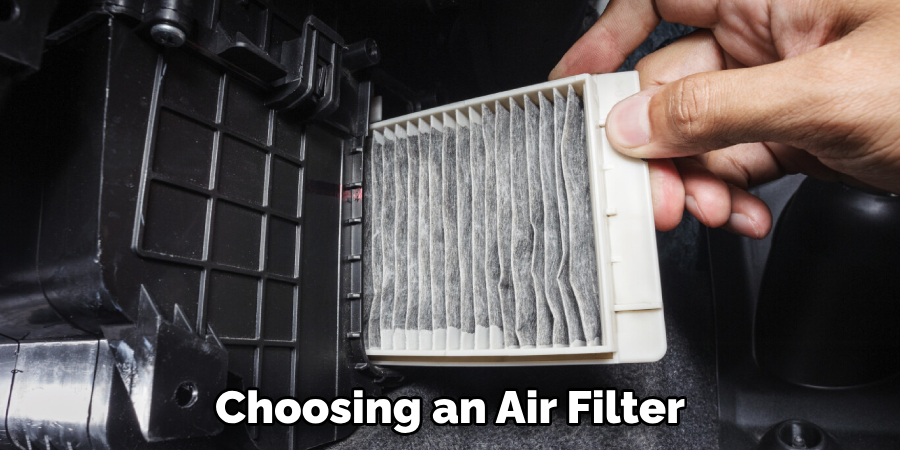
6. Proper Installation and Sealing
Proper alignment and sealing are pivotal to prevent unfiltered air from entering the engine when installing a new air filter. Initiate the process by gently removing the old filter and cleaning any residue within the housing.
Ensure the new filter matches the old one in size and shape; then, carefully insert it, paying attention to the manufacturer’s instructions for correct orientation. Confirm that it sits flush against the housing’s contours, leaving no gaps.
Inspect the air filter housing for worn gaskets or seals and replace them as needed, as air leaks can lead to reduced power and increased emissions. It’s also essential to secure the housing correctly; a loose housing can allow contaminants to bypass the filter.
By meticulously resealing the housing, you safeguard the engine from destructive particles and maintain optimal performance. Failure to ensure a tight seal can result in particulate ingress, undermining your Jeep’s power and contributing to its environmental footprint.
That’s it! You’ve now learned how to extend the life of jeep air filter. Remember, regular inspections, appropriate cleaning or replacement as needed, and proper installation all contribute to a healthy engine and optimal driving experience. So take care of your Jeep’s air filter, and it will take care of you on the open road!
Additional Tips for Off-Road Enthusiasts
Off-road enthusiasts who regularly challenge their Jeeps with dusty, unpaved terrain should consider equipping their rigs with pre-filters or filter outerwear. These add an extra layer of defense, catching larger particles before they reach the primary filter, thereby extending its service life.
It’s crucial, after each off-road adventure, to conduct a thorough cleaning of the air filter. Off-roading can cause an influx of heavy dust and debris, which dictates a compressive air blow-out or washing with manufacturer-recommended solutions, ensuring no compromise is made on engine performance.
Additionally, modifications like snorkels or upgraded air intakes may enhance the performance but could also reduce the lifespan of the air filter and potentially affect the vehicle’s warranty. Always consult with the manufacturer guidelines and consider aftermarket changes carefully to maintain the warranty and ensure proper filtration efficacy.
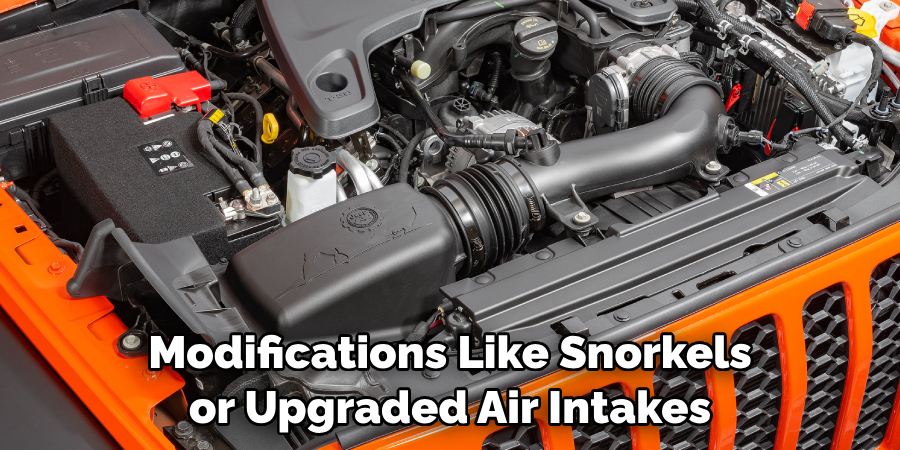
Monitoring Engine Performance and Fuel Economy
Tracking your Jeep’s performance and fuel economy after replacing the air filter is vital in assessing the effectiveness of regular air filter maintenance. An improved air filter allows for better airflow, leading to a more efficient fuel burn and a noticeable boost in power and acceleration.
Monitoring your Jeep’s mileage and performance data before and after a filter change can provide tangible evidence of the benefits. Regularly checking these metrics confirms that your engine is running optimally and reinforces the importance of proactive vehicle maintenance.
5 Benefits of Extending the Life of Your Jeep Air Filter
For automotive enthusiasts and DIY car owners, maintaining an efficient and well-functioning vehicle is a priority. One often overlooked aspect of vehicle maintenance is the air filter, whose health is crucial for your Jeep’s longevity and performance. Let’s explore the five key benefits of extending the life of your Jeep air filter and how it translates to a smoother ride and more enjoyable driving experience.
1. Improved Engine Performance
When your Jeep’s engine breathes better, it performs better. Clean, unobstructed airflow is vital for maintaining engine efficiency and power output.
- Enhanced Air Flow: A clean air filter allows for an optimal air inflow into the combustion chamber, improving acceleration and responsiveness.
- Reduced Engine Strain: An air filter that is free of debris reduces the load on the engine, preventing overheating and potential mechanical failure.
- Increased Horsepower: With a balanced air-to-fuel ratio aided by a proper air filter, you may even notice a boost in horsepower, giving your Jeep that extra punch when you need it.
2. Better Fuel Efficiency
Fuel economy is top-of-mind for many drivers today, and the state of your Jeep’s air filter directly influences it.
- Cleaner Air Intake: The air filter’s primary function is to allow clean air into the engine, ensuring a purer fuel combustion process.
- Optimal Fuel-to-Air Ratio: A clean filter maintains the correct mixture, avoiding a rich or lean mix that can lead to inefficient fuel burn.
- Lower Fuel Consumption: With a more efficient combustion process, your Jeep can travel further on the same amount of fuel, keeping your wallet and your tank fuller for longer.

3. Cost Savings
Financial savings are always a win-win; maintaining your air filter can contribute to that by reducing your need to spend on replacements and maintenance.
- Avoidance of Frequent Air Filter Replacements: By regularly cleaning and caring for your air filter, you can stretch the intervals between replacements.
- Reduced Maintenance Expenses: An air filter in good condition can prevent other engine parts from working harder than they need to, thus saving on repairs.
- Extended Engine Lifespan: The compounds of less strain and clean air can lead to longer-lasting engine components, allowing you to save for future investments instead of repairs.
4. Environmental Impact
Extending the life of your Jeep’s air filter also has benefits that extend beyond your own vehicle.
- Decreased Waste from Disposable Air Filters: Using your air filter for longer reduces waste to landfills.
- Reduced Carbon Emissions: Efficient fuel combustion facilitated by a clean air filter means fewer emissions are expelled from your Jeep, contributing to cleaner air.
- Eco-friendly Choice: Overall, taking care of your air filter is part of responsible vehicle ownership and environmental stewardship.
5. Enhanced Engine Protection
The air filter functions as the first line of defense for your engine against external contaminants.
- Filtering Out Harmful Particles and Debris: Dust, pollen, and other particles are trapped by the air filter, preserving the internal cleanliness of the engine.
- Preventing Engine Damage: With fewer abrasives entering the engine, risks of damage to the cylinders, pistons, and other components are minimized.
- Prolonged Engine Lifespan: Ultimately, a well-protected engine is an engine that lasts. Ensure its longevity by keeping your air filter in top condition.
Regular care and attention to your Jeep’s air filter reap benefits that range from monetary savings to environmental responsibility. It’s not just about maintenance—it’s about optimizing your driving experience and preserving the robustness of your vehicle for years to come. So, next time you check under the hood, give your air filter a little extra thought. It might make all the difference on your next adventure.
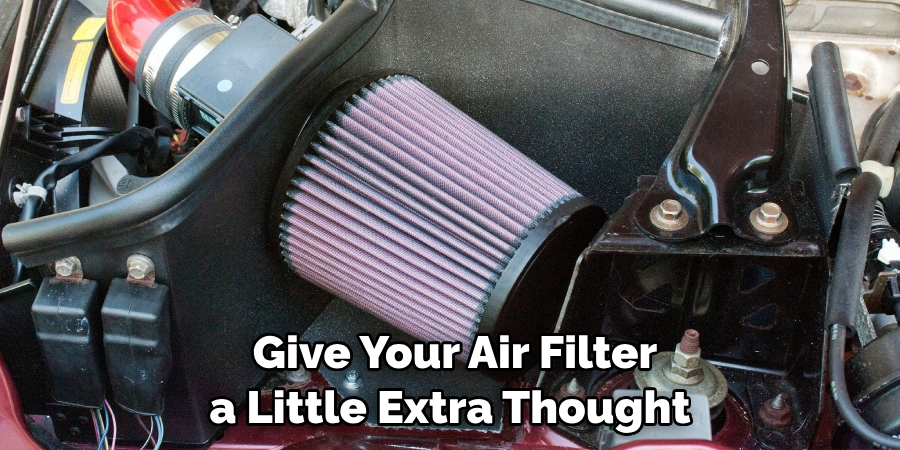
Frequently Asked Questions about Jeep Air Filters
How Often Should I Replace My Jeep’s Air Filter?
Replacement Frequency: Typically, air filters should be replaced every 12,000 to 15,000 miles, depending on your driving conditions. However, consult your Jeep’s owner manual for the manufacturer’s recommendation.
Can I Clean My Air Filter Instead of Replacing It?
Cleaning vs. Replacement: Certain types of air filters can be cleaned and reused, but it depends on the material and design. Disposable filters must be replaced, whereas reusable filters can be cleaned according to the manufacturer’s instructions.
Will a Performance Air Filter Improve My Jeep’s Horsepower?
Performance Filters and Horsepower: A performance air filter can improve airflow, possibly contributing to a slight increase in horsepower. Still, the difference may not be significant for all models and depends on other engine configurations.
Does the Type of Air Filter I Use Impact My Fuel Economy?
Air Filter Type and Fuel Economy: Yes, a clean air filter ensures a more efficient air-fuel mixture, which can enhance fuel combustion and improve your fuel economy.
Are There Any Indicators that My Air Filter Needs to Be Checked or Replaced?
Indicators for Air Filter Maintenance: If you notice a decrease in fuel efficiency, unusual engine sounds, a decrease in acceleration, or visible dirt and clogs in the air filter, it might be time to check or replace it.
Is It Environmentally Friendly to Use a Washable/reusable Air Filter?
Environmental Impact of Reusable Filters: Yes, using a washable air filter can be more eco-friendly because it reduces waste and the need for frequent replacements.
Can an Old Air Filter Cause My Jeep to Fail an Emissions Test?
Emissions Test and Old Air Filters: A dirty air filter can affect your engine’s performance, which may lead to higher emissions and the potential to fail an emissions test.
Regular maintenance and understanding of your Jeep’s air filter can significantly impact vehicle performance, cost savings, and environmental contributions. Make sure to address any concerns and adhere to proper care guidelines to ensure optimum vehicle operation.
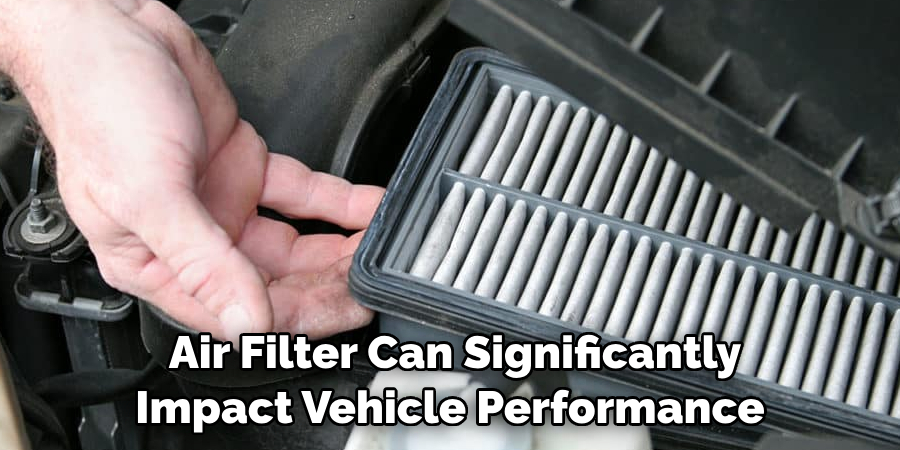
Conclusion
Proactive maintenance, including regular inspections, cleaning, and timely replacement of Jeep air filters, is critical. Adhering to these best practices extends filter life, protects your engine, and enhances driving performance.
Always consult your vehicle’s manual and service professionals for personalized recommendations to ensure longevity and peak efficiency. Thanks for reading our post about how to extend the life of jeep air filter.

